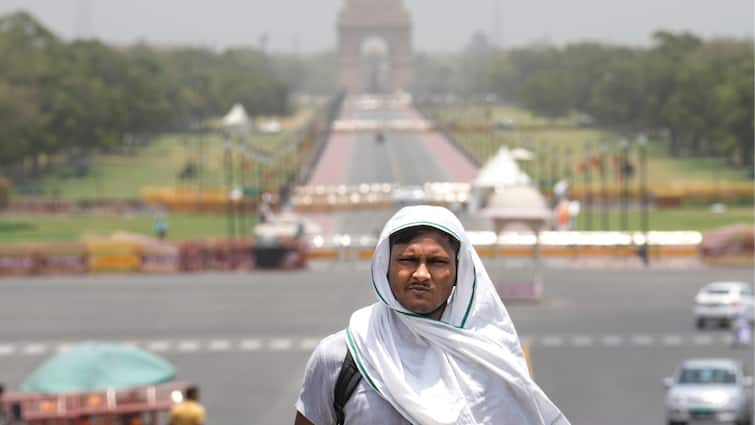Delhi Heatwave: Government Issues Advisory, Warns Of Heatstroke

Table of Contents
Government Advisory Details: Key Recommendations to Combat Delhi Heat
The Delhi government's advisory urges citizens to take immediate precautions to protect themselves from the extreme heat. The key recommendations focus on minimizing exposure to the sun during peak hours and staying adequately hydrated. Here's a breakdown of the crucial advice:
-
Limit outdoor activities between 12 pm and 4 pm: These are the hottest hours of the day when the risk of heatstroke is highest. Reschedule outdoor activities for early morning or evening when temperatures are cooler.
-
Drink plenty of water, ORS, and other hydrating fluids: Dehydration is a major factor contributing to heatstroke. Keep your fluid intake high throughout the day, even if you don't feel thirsty. Oral Rehydration Solutions (ORS) are particularly helpful in replacing lost electrolytes.
-
Wear light-colored, loose-fitting clothing: Dark colors absorb more heat. Loose clothing allows better air circulation, helping to keep you cooler.
-
Use sunscreen with a high SPF: Protect your skin from the sun's harmful ultraviolet rays by applying a broad-spectrum sunscreen with an SPF of 30 or higher. Reapply every two hours, especially after swimming or sweating.
-
Check on vulnerable populations (elderly, children): The elderly and children are particularly susceptible to heatstroke. Regularly check on your vulnerable neighbors, relatives, and friends.
You can find the complete official government advisory .
Understanding Heatstroke Symptoms and Prevention in the Delhi Heat
Heatstroke is a life-threatening condition caused by prolonged exposure to high temperatures. It's crucial to understand its symptoms and how to prevent it.
Heatstroke Symptoms: Symptoms can include:
- High body temperature (above 103°F or 39.4°C)
- Confusion
- Dizziness
- Headache
- Rapid pulse
- Seizures
- Loss of consciousness
Heat Exhaustion vs. Heatstroke: Heat exhaustion is a milder form of heat-related illness, often characterized by heavy sweating, weakness, and dizziness. If left untreated, heat exhaustion can progress to heatstroke.
Preventing Heatstroke:
- Recognize early warning signs: Pay attention to your body and others around you. If you experience any symptoms of heat exhaustion, take immediate action.
- Seek immediate medical attention if heatstroke is suspected: Heatstroke is a medical emergency. Call emergency services immediately if you suspect someone is suffering from heatstroke.
- Cool the body down gradually if heatstroke occurs: If heatstroke occurs, move the person to a cool place and try to lower their body temperature gradually using cool water or wet cloths.
Vulnerable Groups and Special Precautions During Delhi's Scorching Temperatures
Certain groups are more vulnerable to the effects of the Delhi heatwave. These include:
- Elderly individuals: Their bodies may not regulate temperature as efficiently.
- Children: Children dehydrate more quickly than adults.
- Pregnant women: Pregnancy increases the risk of overheating.
- Individuals with chronic illnesses: Conditions like heart disease or diabetes can increase heatstroke risk.
Extra Precautions:
- Regularly check on elderly relatives and neighbors: Make sure they are staying hydrated and cool.
- Keep children hydrated and indoors during peak heat hours: Provide them with plenty of fluids and limit their outdoor activities.
- Ensure access to cool spaces for vulnerable individuals: Cooling centers or air-conditioned spaces are vital for those at higher risk.
- Provide extra care for individuals with pre-existing health conditions: Work closely with their healthcare providers to manage their condition during the heatwave.
Coping Mechanisms and Resources for Delhi Residents During the Heatwave
Staying cool and comfortable during the Delhi heatwave requires proactive measures.
Staying Cool at Home:
- Use air conditioning or fans effectively: Air conditioning is the most effective way to stay cool, but fans can also help.
- Take cool showers or baths: This can significantly lower your body temperature.
- Use wet cloths to cool the skin: Applying cool, wet cloths to your skin can provide relief.
Available Resources:
The Delhi government may establish cooling centers in various locations. Check local news and government websites for updates on their locations and availability. Emergency helpline numbers may also be available; check local authorities for these details.
Conclusion: Stay Safe and Informed During the Delhi Heatwave
The Delhi heatwave presents a serious health risk. Following the government's advisory and taking preventative measures are crucial to protect yourself and others. Remember to stay hydrated, limit outdoor activity during peak hours, and monitor vulnerable populations. Learn to recognize the symptoms of heatstroke and seek immediate medical help if needed. Stay informed about the heatwave through official channels and share this information with your loved ones to help them stay safe from the Delhi heatwave. Protect yourself from heatstroke and prepare for the Delhi heat – your health depends on it.

Featured Posts
-
 Hamas Ramadan Deadline Will Edan Alexander And Other Captives Be Freed
May 13, 2025
Hamas Ramadan Deadline Will Edan Alexander And Other Captives Be Freed
May 13, 2025 -
 Sabalenka And Gauffs Dominant Performances Secure Rome Advance
May 13, 2025
Sabalenka And Gauffs Dominant Performances Secure Rome Advance
May 13, 2025 -
 Nhl Draft Lottery Islanders Win Sharks Get Second Pick
May 13, 2025
Nhl Draft Lottery Islanders Win Sharks Get Second Pick
May 13, 2025 -
 Lookman Transfer Saga Liverpools Pursuit Faces Chelsea Challenge
May 13, 2025
Lookman Transfer Saga Liverpools Pursuit Faces Chelsea Challenge
May 13, 2025 -
 Post Quantum Cryptography Billion Dollar Market By 2030
May 13, 2025
Post Quantum Cryptography Billion Dollar Market By 2030
May 13, 2025
